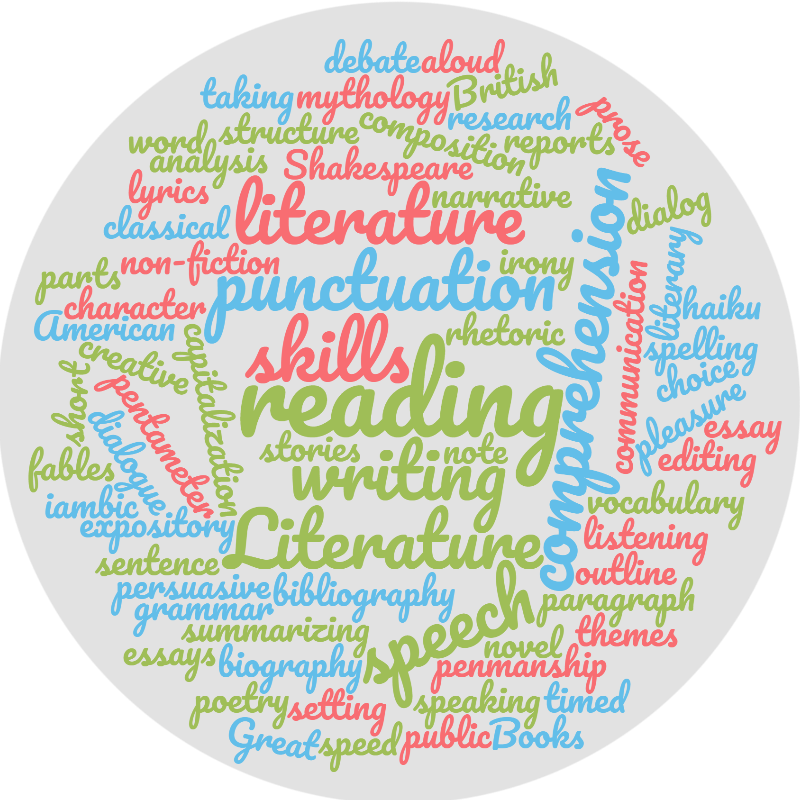English Grading Simplified
Parents are often nervous about high school subjects, and English is one of the more intimidating courses - at least it was for me. High School English can include so MANY things that it can be overwhelming!
You can teach communication skills, spelling, grammar, vocabulary, punctuation, penmanship, composition reports, poetry, prose, reading skills, reading for pleasure, classical literature, non-fiction, reading aloud, speed reading, comprehension, public speaking, speech and debate-
By now you are going cross eyed.
American Literature, British Literature, Great Books, literary analysis, essay writing, research, proof-reading, timed essays, sentence structure, paragraph outline, mythology, fables, capitalization, punctuation, parts of speech, dialogue, word choice, editing, novel writing, short stories, lyrics, iambic pentameter, haiku-
By now all the words are gibberish. But there's still more!
Expository writing, narrative writing, summarizing, creative writing, note taking, persuasive writing, literature appreciation, bibliography, biography, themes, Shakespeare, irony, listening skills, comprehension, character, setting, rhetoric, Socratic dialog.
Whew! It can seem overwhelming, I know. But you must know the truth. You can't do everything. You can't do it all in one year. Focus on what is important: reading and writing. The goal of high school English is clear communication. There are many ways to get there, not everything needs to be covered by all children, and there are many paths to get you where you need to go.
When I'm consulting, people really like to see samples of our graded English papers. They are often surprised when they see how it is "really done" because it's not a magical process at all! Editing papers can be a HUGE thorn in your side! Maybe it will help if we just "get real" to begin with. Let me describe our "Journal Writing" first. Sounds impressive, right? I bought a blank book, and told them to fill one page of the blank book each day. They only had to show it to me from across the room, so that I could see they had written something and filled the page. I didn't actually read what they wrote. That allowed them to keep their journal relatively private, while I could still be sure they were writing in their own handwriting something each day. That was easy, right? But what about "real" papers?
During our early high school years, I was in charge of editing the papers. Day after day I required them to write. They were to spend an hour a day writing something with the goal of producing a 1-2 page paper each week. They were very good about writing. I was very good about making sure they turned it in. Dad was very good about "playing the heavy" and ensuring that the paper was turned in on Friday each week. That's about where it all fell apart. I never seemed to edit the papers. I would read them and get frustrated, and not know where to even BEGIN editing the papers. I put it on my calendar, but still didn't get around to editing them very often.
Finally, seeing me flounder, my husband rode in and saved the day! What a huge relief! I felt enormously guilty, because I am good in English. My husband is an engineer - I should be getting help from him in science and math, right? But the editing was something he was interested in helping with, and it still lightened my load considerably. We shared the same philosophy on editing - which is, of course, that the kids should learn to write.
What does editing look like? In our house, my husband would get the papers and read them once through, from beginning to end. Then he would go back and start over, correcting spelling, grammar, and punctuation. He would make comments like, "this isn't quite clear," or "what are you trying to say?" or "run on sentence," or "use more descriptive terms." Then he would return the paper to my children, and they were required to correct all the edits. Once corrected, they earned their grade for the paper. If they had corrected the edits well, it was an "A." If they had corrected the edits, but didn't do it very well, then they got a "B". Each child was graded based on their own writing ability, using our family mantra "Never compare - someone always gets hurt."
Our philosophy on learning to write is that practice makes perfect. Practice, practice, practice! Write every day - greeting cards, blog posts, and journal entries if you need to! Write every day. It's more important than what curriculum you choose. We also believe that editing is part of the writing process. My husband works at a large company, and as they prepare proposals, entire teams of engineers write, rewrite, and edit each other's work. It's part of life. So, he would edit their papers like he would edit papers at work.
We practiced with the paper each week, and with journal writing as I mentioned. Toward the end of high school, we also taught them how to write a hand written essay in 25 minutes, so that they would succeed in the SAT® test. We didn't edit those essays; my husband would just comment on them and grade them. We used 501 Writing Prompts by Learning Express, and it had a nice explanation on how to grade a short essay like that.
As you have identified, a writer will have a "voice." When my son entered the honors program at the university, the professor commented on his writing "voice." He said that my son was obviously used to reading quality literature. All that literature-based education works! My son got his writing voice from his reading! When you edit, try to keep your corrections to two things: mechanics and clarity. Mechanics means punctuation, grammar, spelling, and other conventions. Clarity means that you can understand what they meant. Much of the rest of writing can be the writers "voice." You can talk to them about their voice, and ask them to write for different purposes and in different styles (first person, narrative, etc.) but they can still have a voice of their own.
We did use Sonlight curriculum for writing. Even when we stopped using Sonlight (because we had already read all of the books!) we continued to use their writing plan. It helped me to know how much to schedule in writing each week. It helped me provide a variety of different assignments each year. So, we used and re-used their writing plan, and I would vary the SUBJECT of each assignment.
Often, I would include delight-directed learning and even let my children decide what to write about. For example, they could write about ANY novel they had read this year, or write about ANY subject area they were studying in school, not just history. Again, my goal was for them to learn to write, and I felt that they would learn more if they enjoyed it. Letting them choose the subject of each kind of assignment was a way for them to enjoy writing more. They didn't like hard work any more than the next kid, but they did seem to tolerate it better when they could choose the subject. Read my post about how to implement Delight Directed Learning in your homeschool.
They would sometimes write too much on the subject they loved. Toward the end of the year, my instructions were more specific. "You can write on anything, but nothing involving anyone on Mt. Rushmore" By letting them choose their subject, and guiding them to choose a variety of subjects, we ended up having a written paper in almost every course each year. It was very helpful when I needed something to document classes like Art, Music, and Economics.
Writing instruction varies widely between families. If you have a curriculum or instruction method that is working well for you and your children, then keep using it. If you have struggled to find just the right thing, then keep looking, but also remember that PRACTICE writing is the most important thing. Getting feedback on written work will ultimately improve writing the most.
If you liked this article, please forward it to your friends at your homeschool group or co-op, as well as friends who are considering homeschooling. They can subscribe to The HomeScholar Record and get great homeschooling high school hints, tips and advice delivered to their inbox each month!
Check out some reviews from our customers!
Lee,
I just had to stop for a second and take the time to thank you for your information. I just ordered your transcript program with all the free gifts and it is the best money I have ever spent for homeschooling.
I know without a doubt now that I can successfully homeschool my daughter through high school with the confidence that she will be able get into college without concerns because she was home schooled.
Thank you for making this information available and at such a reasonable cost. I have only gone through about 25% of all I received today, but feel like the weight of the world has been lifted off from my shoulders about transcripts, grading, credits, planning etc. You have made this so much easier.
I am referring your program to lots of others. You just have so many answers to the questions we were all asking each other.
Thank you,
Carly
~~~
"Your transcripts and records were the best organized and documented I have seen"
- Bryan Jones, Associate Director of Admissions,
Seattle Pacific University
When you subscribe to the blog, we will send you an e-mail when there are new updates on the site so you wouldn't miss them.

 Login
Login











.jpg)

Comments